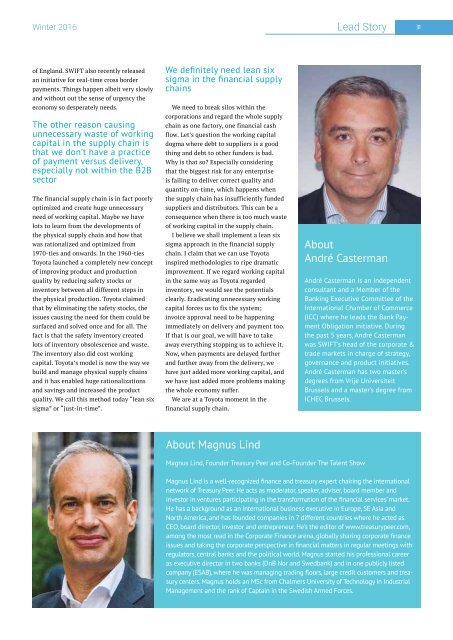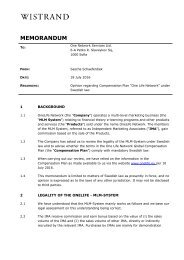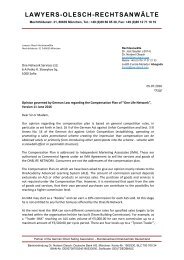Revolutionizing the Financial Markets
With more than 100 000 subscribers of which 70% are banks, Financial IT is focused on publishing news about the leading financial technologies in the world, including the blockchain technology and cryptocurrencies. The February issue of the magazine dedicates its cover to the Founder and CEO of OneCoin, Dr. Ruja Ignatova, and with a 2 pages article sharing OneCoin's story & vision to the world. As Financial IT continies to follow the developments in the company, we are pleased to be recognized as one of the major cryptocurrencies and a key player that shapes the future of payments.
With more than 100 000 subscribers of which 70% are banks, Financial IT is focused on publishing news about the leading financial technologies in the world, including the blockchain technology and cryptocurrencies.
The February issue of the magazine dedicates its cover to the Founder and CEO of OneCoin, Dr. Ruja Ignatova, and with a 2 pages article sharing OneCoin's story & vision to the world. As Financial IT continies to follow the developments in the company, we are pleased to be recognized as one of the major cryptocurrencies and a key player that shapes the future of payments.
You also want an ePaper? Increase the reach of your titles
YUMPU automatically turns print PDFs into web optimized ePapers that Google loves.
Winter 2016 Lead Story 31<br />
of England. SWIFT also recently released<br />
an initiative for real-time cross border<br />
payments. Things happen albeit very slowly<br />
and without out <strong>the</strong> sense of urgency <strong>the</strong><br />
economy so desperately needs.<br />
The o<strong>the</strong>r reason causing<br />
unnecessary waste of working<br />
capital in <strong>the</strong> supply chain is<br />
that we don’t have a practice<br />
of payment versus delivery,<br />
especially not within <strong>the</strong> B2B<br />
sector<br />
The financial supply chain is in fact poorly<br />
optimized and create huge unnecessary<br />
need of working capital. Maybe we have<br />
lots to learn from <strong>the</strong> developments of<br />
<strong>the</strong> physical supply chain and how that<br />
was rationalized and optimized from<br />
1970-ties and onwards. In <strong>the</strong> 1960-ties<br />
Toyota launched a completely new concept<br />
of improving product and production<br />
quality by reducing safety stocks or<br />
inventory between all different steps in<br />
<strong>the</strong> physical production. Toyota claimed<br />
that by eliminating <strong>the</strong> safety stocks, <strong>the</strong><br />
issues causing <strong>the</strong> need for <strong>the</strong>m could be<br />
surfaced and solved once and for all. The<br />
fact is that <strong>the</strong> safety inventory created<br />
lots of inventory obsolescence and waste.<br />
The inventory also did cost working<br />
capital. Toyota’s model is now <strong>the</strong> way we<br />
build and manage physical supply chains<br />
and it has enabled huge rationalizations<br />
and savings and increased <strong>the</strong> product<br />
quality. We call this method today “lean six<br />
sigma” or “just-in-time”.<br />
We definitely need lean six<br />
sigma in <strong>the</strong> financial supply<br />
chains<br />
We need to break silos within <strong>the</strong><br />
corporations and regard <strong>the</strong> whole supply<br />
chain as one factory, one financial cash<br />
flow. Let’s question <strong>the</strong> working capital<br />
dogma where debt to suppliers is a good<br />
thing and debt to o<strong>the</strong>r funders is bad.<br />
Why is that so? Especially considering<br />
that <strong>the</strong> biggest risk for any enterprise<br />
is failing to deliver correct quality and<br />
quantity on-time, which happens when<br />
<strong>the</strong> supply chain has insufficiently funded<br />
suppliers and distributors. This can be a<br />
consequence when <strong>the</strong>re is too much waste<br />
of working capital in <strong>the</strong> supply chain.<br />
I believe we shall implement a lean six<br />
sigma approach in <strong>the</strong> financial supply<br />
chain. I claim that we can use Toyota<br />
inspired methodologies to ripe dramatic<br />
improvement. If we regard working capital<br />
in <strong>the</strong> same way as Toyota regarded<br />
inventory, we would see <strong>the</strong> potentials<br />
clearly. Eradicating unnecessary working<br />
capital forces us to fix <strong>the</strong> system;<br />
invoice approval need to be happening<br />
immediately on delivery and payment too.<br />
If that is our goal, we will have to take<br />
away everything stopping us to achieve it.<br />
Now, when payments are delayed fur<strong>the</strong>r<br />
and fur<strong>the</strong>r away from <strong>the</strong> delivery, we<br />
have just added more working capital, and<br />
we have just added more problems making<br />
<strong>the</strong> whole economy suffer.<br />
We are at a Toyota moment in <strong>the</strong><br />
financial supply chain.<br />
About<br />
André Casterman<br />
André Casterman is an independent<br />
consultant and a Member of <strong>the</strong><br />
Banking Executive Committee of <strong>the</strong><br />
International Chamber of Commerce<br />
(ICC) where he leads <strong>the</strong> Bank Payment<br />
Obligation initiative. During<br />
<strong>the</strong> past 5 years, André Casterman<br />
was SWIFT’s head of <strong>the</strong> corporate &<br />
trade markets in charge of strategy,<br />
governance and product initiatives.<br />
André Casterman has two master’s<br />
degrees from Vrije Universiteit<br />
Brussels and a master’s degree from<br />
ICHEC Brussels.<br />
About Magnus Lind<br />
Magnus Lind, Founder Treasury Peer and Co-Founder The Talent Show<br />
Magnus Lind is a well-recognized finance and treasury expert chairing <strong>the</strong> international<br />
network of Treasury Peer. He acts as moderator, speaker, adviser, board member and<br />
investor in ventures participating in <strong>the</strong> transformation of <strong>the</strong> financial services’ market.<br />
He has a background as an international business executive in Europe, SE Asia and<br />
North America, and has founded companies in 7 different countries where he acted as<br />
CEO, board director, investor and entrepreneur. He’s <strong>the</strong> editor of www.treasurypeer.com,<br />
among <strong>the</strong> most read in <strong>the</strong> Corporate Finance arena, globally sharing corporate finance<br />
issues and taking <strong>the</strong> corporate perspective in financial matters in regular meetings with<br />
regulators, central banks and <strong>the</strong> political world. Magnus started his professional career<br />
as executive director in two banks (DnB Nor and Swedbank) and in one publicly listed<br />
company (ESAB), where he was managing trading floors, large credit customers and treasury<br />
centers. Magnus holds an MSc from Chalmers University of Technology in Industrial<br />
Management and <strong>the</strong> rank of Captain in <strong>the</strong> Swedish Armed Forces.





